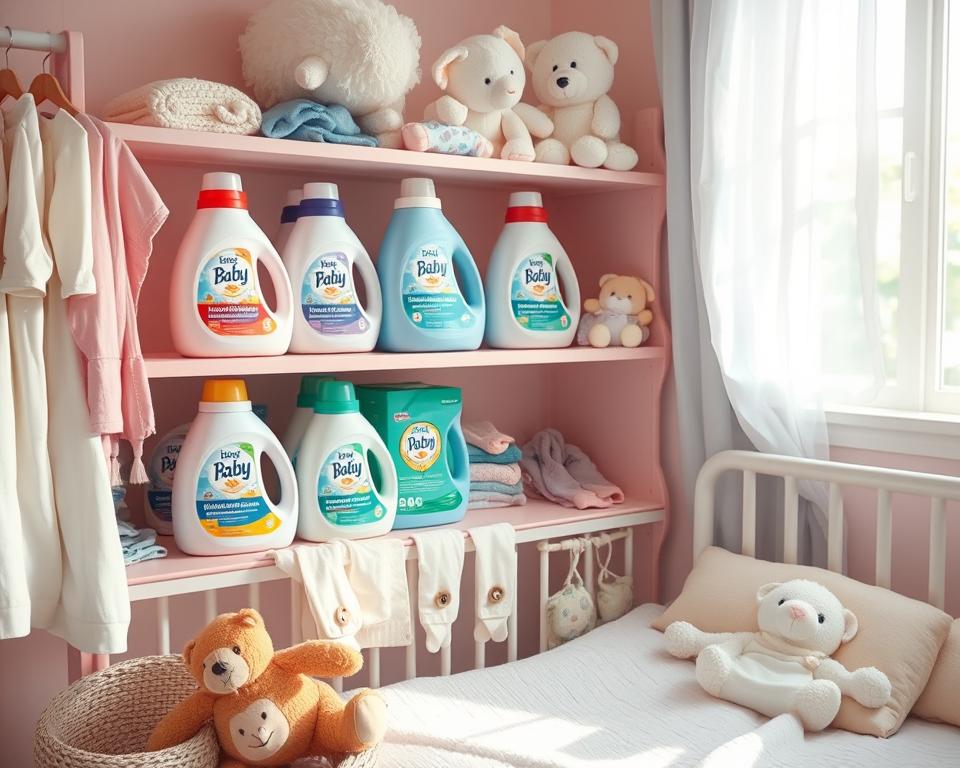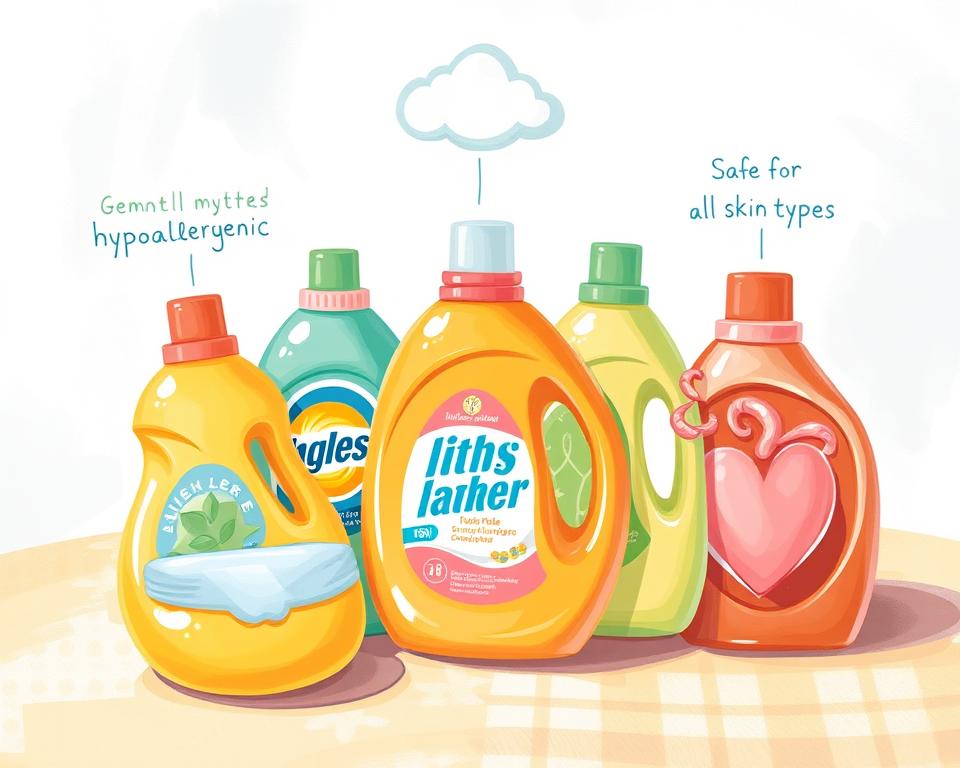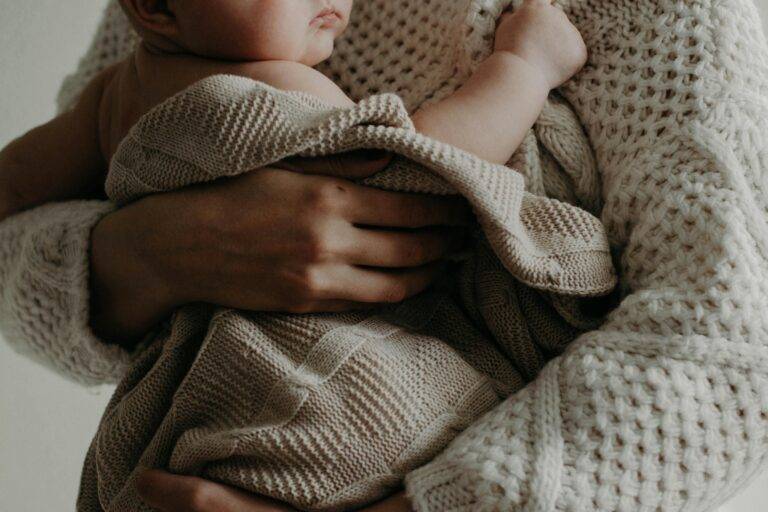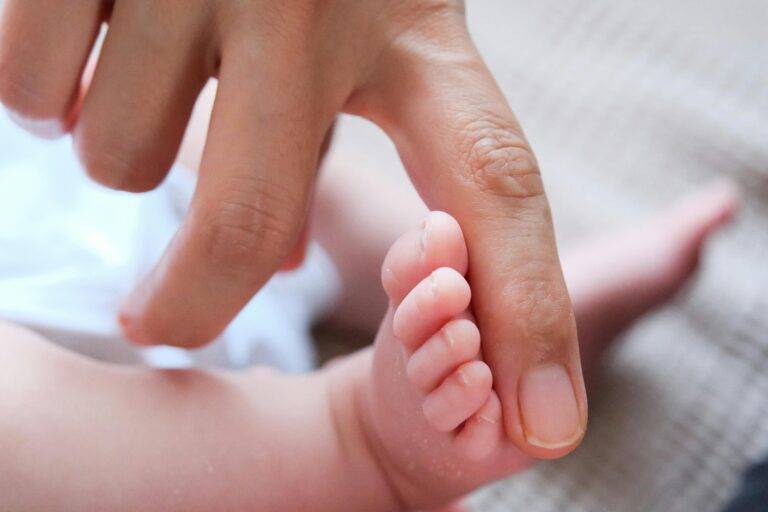When it comes to caring for your baby, choosing the right infant laundry detergent is crucial. Babies possess significantly more sensitive skin than adults, making them at higher risk of skin irritation or allergies from harsh detergent ingredients. Traditional detergents often contain harmful ingredients such as sulfates, which can lead to dryness and increased sensitivity on delicate skin1. Therefore, using specially formulated hypoallergenic detergents is essential for maintaining your child’s comfort and skin health2.
Infant laundry detergents are designed to be gentle and effective while avoiding common irritants like fragrances and dyes, which can trigger reactions, particularly in eczema-prone babies2. By selecting baby detergents that are certified hypoallergenic and free from harmful chemicals such as VOCs, chlorine, and parabens, you can provide a safer washing solution for your little one1. This guide will delve further into the significance of these specialized detergents, helping you make informed decisions for your baby’s clothing care.

What is Infant Laundry Detergent?
Infant laundry detergent is a specialized cleaning product tailored to meet the unique needs of babies. These products are designed to be gentle on sensitive skin while effectively removing stains. Newborns have particularly delicate skin, making the selection of a hypoallergenic detergent crucial to prevent skin irritations, such as rashes and peeling, which can occur in the first few weeks after birth3. Most baby detergents are formulated with fewer harsh chemicals and are often perfume and dye-free3. This ensures that the risk of allergic reactions remains low.
According to a survey conducted among 29 parents, key aspects that influence their choice of detergent include effectiveness, value, and softness4. Parents typically invest significant amounts in baby-related expenses, averaging around $1,000 per year on diapers alone, which highlights the importance of selecting effective and affordable cleaning solutions4. Many baby laundry detergents, such as Tide Free & Gentle, Arm & Hammer Sensitive Skin, and Seventh Generation, are considered top-rated for their hypoallergenic properties and effectiveness4.
Why Use Specially Formulated Detergents?
Choosing a gentle detergent specifically designed for infants is essential, as newborns often have delicate skin that is highly sensitive to irritants found in standard laundry products. Specially formulated hypoallergenic detergents help prevent rashes and skin irritations, significantly enhancing the comfort of your baby5. These detergents typically exclude fragrances, dyes, and optical brighteners that can aggravate sensitive skin, ensuring a safer wash for tiny clothes5.
Many baby detergents are made with enzyme-based formulas, effectively tackling tough stains like spit-ups and diaper blowouts while being gentle on the skin6. Ingredients to look for include mild surfactants, such as alkyl polyglycolide or lauryl glucoside, and softening agents like plant-based quaternary ammonium compounds, which provide safety and skin-friendly properties6. This is particularly important as traditional detergents often contain harsh chemicals that can strip natural oils, leading to dryness and irritation7.
For those managing allergies or asthma, hypoallergenic options are recommended, particularly those that have been dermatologist-tested and are recognized by pediatric associations as safe for use5. The use of specially formulated sensitive skin detergents not only helps maintain healthy skin but can also contribute to a more nurturing environment as babies develop7. Parents might consider eco-friendly choices, like Blueland’s plastic-free laundry tablets, which are both effective and gentle on sensitive skin. For more detailed guidance about baby-friendly laundry detergents, visit this helpful article.
Top Brands of Infant Laundry Detergent
When choosing the right laundry detergent for your baby, it’s essential to consider the most popular baby detergent brands available on the market. Brands such as Babyganics, Attitude, and Tide Free & Gentle are well-regarded for their effectiveness and safety. Babyganics Liquid Baby Detergent, priced at $20, claims to handle up to 60 loads and is made in the USA without animal testing8. Attitude Little Ones Fragrance Free Laundry Detergent stands out with a price of $25 and boasts an A rating on EWG for its hypoallergenic qualities8. Tide Free & Gentle has received 100% approval from parents for newborn laundry due to its gentleness, featuring an average cost per load of $0.204.
For parents interested in eco-friendly detergent options, Puracy Natural Laundry Detergent, priced at $20, is made without harmful chemicals and works for up to 96 loads8. Seventh Generation Free and Clear is another popular choice, priced at $25 and suitable for about 53 loads, although it contains potential irritants8. With 100% of dermatologists recommending it, Seventh Generation has established itself as a trusted brand in infant laundry care4.
Honest Hypoallergenic Baby Laundry Detergent features four stain-fighting enzymes, making it an excellent choice for sensitive skin, with 100% of parents praising its effectiveness4. The cost per load is competitive, ideal for parents seeking a natural detergent alternative. Lastly, Rockin’ Green Platinum Series Detergent is specifically designed for cloth diapers and costs $20, although it may lead to rashes in some babies due to tea tree oil8.
Comparing Liquid vs. Powder Detergents
When choosing between liquid detergent and powder detergent for infant laundry, parents often weigh convenience and performance. Liquid detergents excel in handling greasy stains and are especially effective against body soil, making them a favorite for food-related messes9. They dissolve quickly in water, even in cooler temperatures, which enhances their ease of use9. This characteristic is particularly beneficial because heating water can significantly increase energy consumption during laundry9.
On the flip side, powder detergents are renowned for their ability to tackle more durable stains like dirt and mud9. They typically offer a longer shelf life and are more cost-effective, presenting an economical option for families10. Parents may find powder detergents to be less expensive than their liquid counterparts, which can be appealing for budget-conscious shoppers11.
A key consideration is that liquid detergents measure out easily and reduce the likelihood of spills, a practical advantage for busy parents10. While powder detergents may require some mixing in warm water to dissolve completely, their longer usability period is worth noting10. Ultimately, selecting the right type of detergent depends on household preferences and specific laundry needs, whether it’s for gentle detergent options or tackling tough, everyday stains.
Environmental Impact of Infant Laundry Detergents
Infant laundry detergents significantly impact the environment, making it essential for parents to consider eco-friendly options. Choosing an eco-friendly detergent reduces chemical runoff and minimizes pollution in our waterways. Many brands offer non-toxic detergent options that utilize biodegradable formulas made from plant-based ingredients, ensuring they are safer for both infants and the environment12.
It’s worth noting that laundry detergent is now among the top 10 most used products in households with infants, highlighting its ubiquitous nature in daily routines. Parents with infants often require up to three outfit changes daily for every family member, further emphasizing the importance of selecting environmentally responsible products13. The EPA’s Safer Choice program certifies that cleaning products, including infant laundry detergents, do not contain harmful chemicals, promoting healthier choices for families13.
Notably, ARM & HAMMER™ provides a variety of environmentally conscious laundering options. Their products are made from recycled materials, and the manufacturing process utilizes 100% certified renewable electricity12. They are committed to reducing water usage by 118,000 tons and plastic usage by 7 million pounds by 2024 through concentrated liquid detergent12. Furthermore, ARM & HAMMER™ Baby Detergent is free from harmful additives like dyes and phosphates, aligning closely with the needs of parents searching for safe, non-toxic, plant-based detergent alternatives12.
How to Choose the Right Detergent for Your Baby
Selecting the right detergent for your baby involves careful consideration of several factors. Start by looking for a non-toxic detergent that is hypoallergenic and free from dyes, preservatives, and GMOs to ensure it is gentle on your child’s delicate skin14. A dermatologist-tested detergent offers additional peace of mind, confirming that the product has been evaluated for safety and compatibility with sensitive skin15.
Examine the ingredient list closely. Avoid brighteners and harsh chemicals, as these can irritate the skin and make laundering less effective14. Opt for options like Dreft, known as the #1 pediatrician-recommended brand, which provides safety for babies through its EPA Safe Choice seal15. Consider the effectiveness of the detergent in dealing with common baby stains, such as those from food or mud.
It’s also important to understand the cleaning process. Washing baby clothes before their first use removes potential irritants and chemicals from new fabric14. Following the care label instructions for washing temperatures will help maintain the integrity of the fabric and prevent issues such as pilling14.

To help narrow down your baby detergent selection, create a checklist of must-have attributes. Ensure that the detergent is gentle, effective, and highly rated for safety and sensitivity. Remember, avoiding fabric softeners and dryer sheets retains flame retardancy, which is crucial for children’s garments14. Lastly, keeping price ranges in mind can help in making an informed decision, as options vary widely from budget-friendly to premium products16.
Dos and Don’ts of Washing Baby Clothes
Washing baby clothes requires special attention to ensure safety and cleanliness. Always wash baby clothes separately from adults’ laundry to prevent cross-contamination. This practice, along with using a pediatrician-recommended detergent like Dreft, enhances overall baby clothing care1718. Choosing the correct water temperature is crucial in the washing process; experts recommend using cold water to prevent shrinking and damage while maintaining fabric integrity17. It is essential to avoid fabric softeners and dryer sheets, which can irritate sensitive skin18.
Another vital tip includes ensuring that ample rinsing occurs to eliminate detergent residues that may cause skin irritation. A double rinse cycle guarantees that no allergens remain on the clothes, enhancing comfort for your infant18. Be aware of stains before washing; treating them promptly prevents them from setting in, making them easier to remove later18. When it comes to drying baby clothes, use a low heat setting or air dry them to protect delicate fabrics and avoid potential skin reactions. This approach is part of important infant laundry tips that prioritize gentle care.
Tips for Safe and Effective Laundry Practices
When caring for your infant’s clothing, incorporating effective laundry tips can significantly enhance both laundry safety and the longevity of garments. Daily laundry becomes essential in a household with a newborn, given the need to frequently wash bibs, burp cloths, and onesies19. Parents are advised to pre-treat stains with baby-safe products immediately after they occur, which can make stain removal easier during washing and help maintain the garment’s lifespan19.
Using the correct amount of a gentle detergent suitable for infants is paramount, as many detergents labeled as “gentle for baby” are available to meet this specific requirement20. Regularly washing baby clothes separately from adult items is crucial to avoid skin irritation caused by residues from harsher detergent formulations19. A consistent washing routine every two days helps maintain hygiene standards while minimizing dirt accumulation19.
After washing, running an extra rinse cycle ensures that all detergent residues are washed away, further promoting laundry safety20. Sunlight acts as a natural disinfectant, making air-drying in the sun an excellent option to enhance both cleanliness and fabric texture19. For delicate items like swaddles and hats, consider cold-washing to preserve fabric integrity19. Remember, securing buttons and other fasteners before washing can prevent damage, which is a common concern for baby clothing20.
Lastly, utilizing products certified under the Safer Choice program can provide peace of mind regarding the safety of the cleaning products you use13. With the majority of laundry detergent becoming one of the most frequently used products in homes, consistency and care in your laundering practices are vital for your child’s well-being13.
Common Myths About Infant Laundry Detergent
Infant laundry detergent myths can often mislead parents regarding the most suitable choices for their babies. One prevalent common misconception is that all detergents are safe for babies, regardless of ingredients. Many of the popular baby-branded detergents can be overpriced, sometimes costing up to three times higher than Free & Clear alternatives21. Parents often believe that more detergent equals better cleaning power; however, this can lead to residue on clothes and potential skin irritations. Free & Clear detergents are recommended by numerous dermatologists and pediatricians as they avoid fragrances and dyes21.
Another myth revolves around the notion that biological detergents are harmful to babies. In reality, scientific studies indicate that enzymes found in biological detergents do not cause more skin irritation compared to non-biological options22. For instance, NHS Choices has thoroughly investigated this topic, finding no substantial evidence advocating the avoidance of biological detergents for washing baby items22. Academic research consistently shows that when used appropriately, Sodium Lauryl Sulfate (SLS) is safe for cleaning products. It’s essential for parents to be informed about these baby detergent facts to make the best choices for their children’s safety and hygiene.

Frequently Asked Questions About Infant Laundry Detergent
When it comes to infant laundry detergent FAQs, many parents wonder about the best time to switch from regular to specialized detergents. According to 85% of pediatricians, using specialized infant laundry detergent for washing baby clothes is highly recommended to minimize the risk of skin irritations23. Understanding the differences between general and infant formulations is crucial; tailored detergents often contain milder ingredients specifically designed for a baby’s sensitive skin, making them a safer choice overall.
Another common question about baby detergent relates to allergy management. Research indicates that 60% of parents opt for hypoallergenic infant laundry detergent, which can significantly reduce the chances of allergic reactions23. Additionally, a significant portion of parents, approximately 72%, seek fragrance-free options to prevent skin irritations, ensuring a gentler cleansing process for their little ones23.
As parents aim to make informed decisions, it’s beneficial to stay abreast of laundry detergent information. Notably, households with infants tend to spend around 26% more on laundry detergent annually compared to those without babies, reflecting the increased need for specialized products23. For more detailed guidance on selecting the safest products for your child, you can explore available resources. This way, parents can equip themselves with the essential knowledge required to care for their child’s delicate skin.
Explore more about the bestpractices and.
FAQ
Q: What is infant laundry detergent?
A: Infant laundry detergent is a specialized cleaning product designed to address the unique needs of babies’ clothing. These detergents are typically hypoallergenic and free from harsh chemicals, dyes, and fragrances, making them safe for delicate infant skin.
Q: Why should I use specially formulated detergents for my baby?
A: Specially formulated detergents are essential for infants because their skin is more sensitive and susceptible to irritants. Using hypoallergenic options helps reduce the risk of rashes and skin irritations, ensuring your baby’s clothes are both clean and gentle on their skin.
Q: What are some popular brands of infant laundry detergent?
A: Popular brands include Seventh Generation, Tide Free & Gentle, and Honest. These brands often feature hypoallergenic formulations, eco-friendly practices, and effective stain removal, making them ideal choices for baby laundry.
Q: Should I choose liquid or powder infant laundry detergent?
A: The choice between liquid and powder detergent depends on personal preference. Liquid detergents are often more effective on tough stains and easier to measure, while powder detergents may provide better value and longer shelf life.
Q: How does the environmental impact of infant laundry detergents matter?
A: Choosing eco-friendly infant laundry detergents is essential for minimizing chemical runoff and pollution. Many brands offer biodegradable formulas with plant-based ingredients, benefiting both your baby and the environment.
Q: What should I consider when selecting a baby detergent?
A: Key factors to consider include hypoallergenic properties, ingredient transparency, and dermatologist certifications. Always look for products that are safe for sensitive skin and evaluate the potential for skin reactions.
Q: What are some dos and don’ts for washing baby clothes?
A: DO wash baby clothes separately from adults’ laundry and choose the appropriate water temperature. DON’T use fabric softeners or dryer sheets that can irritate sensitive skin; also, ensure thorough rinsing to remove any detergent residue.
Q: What tips can enhance the safety of my laundry practices?
A: To enhance safety, pre-treat stains with infant-safe products, measure out the correct amount of detergent, and run an extra rinse cycle to eliminate residues. These steps ensure your baby’s clothes are clean and safe for their delicate skin.
Q: What are common myths about infant laundry detergent?
A: Common myths include the belief that all detergents are safe for babies and that using more detergent yields better cleaning results. In reality, infant laundry detergents are specifically formulated to be safe for sensitive skin, making them a necessary choice.
Q: At what age can I switch my baby’s detergent?
A: You typically can consider switching your baby’s detergent around the time they start solid foods, but it’s essential to monitor for any skin reactions. Always opt for products that remain gentle and safe for sensitive skin.



